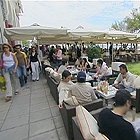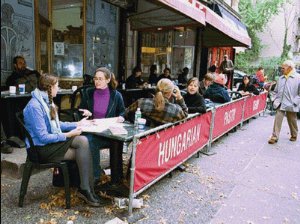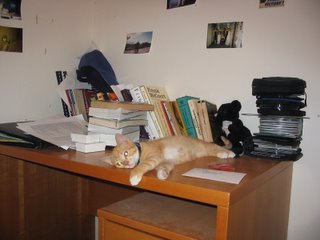
When I first learned that I would be spending a year in Greece, I had a number of conversations with Greeks, Greek-Americans and well-traveled people of all sorts that went something like this:
Emily: Yes, I'll be in Greece for a year.
Person: Where?
Emily: Thessaloniki.
Person: Ooooh. That's good. You'll like it SO much more than Athens.
Complaints about Greece's capital all seem to follow a similar pattern: it's crowded, it's polluted, it's noisy, unpleasant, dirty, etc, etc. After four days there, I have concluded that people say these things either because a) They are from Thessaloniki and are totally biased, b)They have not been to Athens recently or c) I am just completely immune to dirt, pollution, crowds, etc. Maybe it's a combination of all three. Athens is lovely. Really, I liked it very much.
We arrived there on Thursday morning at the crack of dawn, on the night train. I should mention that the night train to Athens takes about six hours, so it doesn't exactly give you enough time for a real night's sleep. However, unlike on the train to Istanbul you don't have to wake up at four am to go through customs, and there were no prostitutes next door, so maybe it's not so bad after all. (By the way, when I say 'we', I mean me, a Greek friend of mine, his Polish girlfriend, and her Spanish and Bulgarian classmates. We were a very international group.)
Our first order of business was to drop things off at our hostel, and to get breakfast from a nearby cafe. Over coffee, we chatted, and I discovered that all of the Spaniards were both utterly fascinated by my American accent, and utterly confused by it. They kept asking me to talk, and then repeating my statements back at me, attempting to imitate my inflections. It was rather amusing. Unfortunately, I did not have much luck understanding them, either, as my Spanish is rusty and more North/Central American than European. When one of my new friends informed me that she is from "Balenthia", it took me a few moments to figure out that she was talking about Valencia. Plus, whenever I dig around in my brain for Spanish vocabulary, Greek appears.

After breakfast, we headed to Syntagma, a central square that houses the Greek Parliament as well as several Greek Parliament guards wearing very strange outfits that include pom-poms on their feet. I am told that these pom poms were designed to hide knives during warfare. I suppose they would hide knives well enough, but they are still not exactly inconspicuous. Here is a photograph of the Changing of the Guard in Syntagma. It was not as elaborate at the similar ceremony at Buckingham Palace, but there were several thousand fewer people in attendance, a fact which made it much more enojyable. (I have been to the Buckingham Palace Changing of the Guard two or three times, and I have always spent the duration of the ceremony squeezed against several hundred American tourists, usually with someone very tall in front of me. Thus, I have managed to catch some of the peripheral action, but I've never actually witnessed the ceremony in full.)
Following the Changing of the Guard, we wandered through the central park of Athens. I don't remember the exact name for it; the National Gardens? I don't know. Anyway, it was mostly closed, as an Israeli official was visiting, and security was tight. I admit that I had a private moment of satisfaction when we were informed of this and one of my co-travellers said "The Israeli President? What's his name? Arafat?" "Aha!" I thought, "Americans are not the only ones who are out of touch with world affairs!"
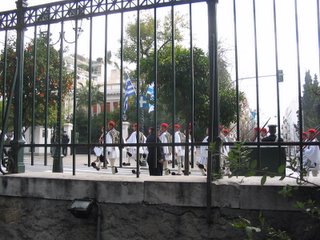
Anyway, here is a picture of the Greek National Guard ushering in the Israeli President. (All right, I'll confess: I don't know if it was the President or some other official, and I don't know the name of whoever it was. I do know it wasn't Arafat, though.) The whole thing took place on a red carpet that was rolled up afterwards. I watched it get rolled back up, and noted with amusement that "Made in the USA" was printed on the underside.
We walked through the park to the Panathenian stadium, an ancient Olympic stadium that was renovated for use in the first modern games as well as the most recent Athens games. It's a beautful stadium, and I was sad to learn that these days, it's mostly just for show. Nobody actually goes running in there. I think this is a pity, as I would love to run around inside the Panathenian Stadium.
It was while I was standing outside the stadium that I first turned around and glimpsed the Acropolis rising above the city. Now, my trusty Lonely Planet guide lists "the first magical view of the Acropolis" as one of the best things about Athens, so it may have been the power of suggestion that caused me to be so thoroughly impressed. But I don't think so. I think it really is just mind-boggling. When you are standing on a modern city street with cars whizzing past and people walking past chatting on their cell phones, you hardly expect to look up and see ancient crumbling ruins that represent the birth of western civilization just sitting there above you. At least, I don't expect that. But they're there. It's breathtaking.
After some more coffee, chocolate croissants and a walk through the cultural museum, we headed for the Acropolis, a trek which involved some map examination as well as some steep climbing up the hill to the Parthenon. It was a stunning trip though; I felt like I was walking back in history as I climbed the hill, and I suppose that in a sense, I was. Finally standing in front of Parthenon, with those massive columns in front of me and the entire city of Athens at my feet was a pretty incredible moment. Unfortunately, it was also fleeting, as the museum was closing (it was 2:30pm) and there were a large number of grouchy women with whistles chasing people around and informing them that it was time to get out. The people, of course, were all trying to take one last picture, or maybe two, or three, or seven. The women were not pleased by this, and continued yelling and gesturing towards the exit. I would have hated these women, but they vaguely reminded me of myself at 11:15 pm, when it is long past the time for the younger students to go to bed and they insist "No, no, I need five more minutes!" So I had some sympathy for them and we decided to save our in-depth trip to the Parthenon for another day.
At that point, sleep deprivation had caught up with all of us, and we made our way back to the hostel for showers and a long nap. In the evening, we woke up and headed to a taverna known for its raki. Raki is kind of like tsipouro, which is kind of like homemade ouzo. This raki, however, was not anise flavored. It was strong, though, and served in little shotglasses, which surprised me. In the movies, Greek people drink ouzo and similar beverages in shotglasses, and toast by shouting "Opa!" before they down the shots in one gulp. In real life, I have never seen a single Greek take a shot of ouzo and "Opa!" is what you shout when someone trips over something, kind of like "Ooops!" or "Watch out!" Well, nobody shouted "Opa"here either, and the Greeks sipped their raki instead of taking it in shots, despite the tiny size of their glasses. The Spanish students, however, insisted upon taking "chipitas" (apparently, this is the Spanish word for shot) and were very confused when the Greeks told them they weren't supposed to drink it that way.
Of course, we did eat as well as drink, and the food was quite excellent. My Greek friend and one of his Athenian friends ordered some sort of meat pie with cheese inside that they insisted was "man's food." Upon further investigation, I learned that "Greek women don't like this dish," and I was welcome to try it if I wanted to, but, being a woman, I would probably hate it. Obviously, at that moment, I decided that I absolutely had to try it, whatever it was, and I was going to say I liked it, whether I actually did or not. As it turns out, it was quite good, and nicely spicy. My friends shrugged at my reaction and said "Oh, maybe American women like [name of mysterious dish]." I don't really understand when I became "American women" in general, why Greek women wouldn't like a perfectly tasty dish, or even what the perfectly tasty dish
was, exactly. It appeared to be something akin to ham with feta, phyllo, and spices. If anyone cares to enlighten me on this matter, please do so.
The next morning was spent in search of a new hotel in Plaka, as a large part of our group was leaving. We found a nice place with a lovely view of the Acropolis for quite a good price. February is really an affordable time to be in Athens, I suppose. Friday afternoon was spent wandering through the Public Gardens (now open to the public), drinking coffee near Syntagma, and getting lost in various areas of the city. We also saw the Temple of Olympian Zeus, or rather, the remains of it, which are quite memorable. There are several massive columns

still standing, and some piles of other bits and pieces below. I have been informed that this temple was damaged during the second world war, when it was bombed by the Nazis. Hitler was apparently very angry at the officers who had caused this destruction, and later had them executed. I'm told by a friend that this is because he so greatly admired the Greeks and considered them the creators of Aryan culture. This whole story is very interesting, but could be exaggerated or mixed up, so don't take my word for it. (I try to be careful about where, exactly, I get my history.)
Now, let me say a few words about the Athens Metro. It's a brand new system, based on the London Underground, and indeed, it's almost the same, right down to the style of the maps


on the walls, and the escalators connecting platforms. However, being a lot newer than the tube, it's also a lot
faster. I could hardly believe how quickly you can zip around, especially since the trains seem to come every three minutes. Oh, and it's clean. I can't believe it. I've never seen a clean subway system in my life. And they play music in the background. Best of all, there's a little electronic sign on each platform to let you know when the next train will arrive. They have these in London, and I always thought they were just about the best things ever. However, the really amazing thing about the Athens metro is that it is full of displays of ancient artifacts that were discovered as the system was being built. Above is a picture of some ancient pottery that used to be were the platforms are now. As I left for the train station early Sunday morning (and believe me, it was
early, because almost every train was sold out) I stood, caffeine-deprived, on the clean platform of the Acropolis station, with a temple frieze in front of me and the Harry Potter theme playing softly in the background. It was a surreal moment.
However, it does get a little crowded now and then, I guess. Honestly, I think my bus (the number 58) in Thessaloniki gets more crowded on a regular basis than any other form of public transportation that I have ever used in my entire life, including the Athenian metro, the New York subway at rush hour, the various tube lines that I used in my study-abroad days in London, etc, etc. The number of people I have seen jammed into that little thing is like clowns in the circus. I've waited for the bus for forty minutes before, because three or four bus drivers in a row wouldn't even open their doors to let more people on.
Ugh.
And that's the end of my little Bus 58 rant. The point is, Athens may be more crowded than Thessaloniki in general, but that doesn't mean that Thessaloniki doesn't have crowds. Actually, I was amused by my friends' reactions to Athens in general; one of them kept breathing in and making faces, insisting "ugh, this atmosphere is terrible." I told him that I honestly didn't have any idea what he was talking about. I think my lungs need dirt to survive. He was also unhappy with the moderate crowds we saw on the Athenian metro. He's from Thessaloniki, but clearly he is
not familiar with the number 58 bus.
Enough with the dirt and the crowds. Here are some lovely pictures of the National Gardens. You'll see that they have turtles, fish (a whole petting zoo, in fact) and, of course, men playing backgammon.


And, here are some nice shots of the Panathenian stadium at night, as they were turning on the lights, and by day. I like it better at night.
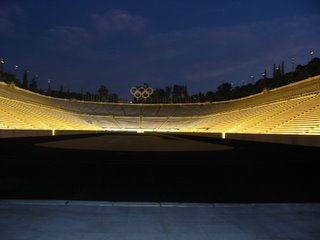

Our evening trip to the stadium was followed by dinner at a nice taverna in Plaka.

Plaka is the area surrounding the Acropolis, and it's lovely, with winding little streets and lots of nice tavernas. It's also the tourist center of Athens, however, and I swear I haven't seen so many Americans in one place since August. Here's a picture of a Plaka street by night.
(Speaking ofeating in Athens, I have been informed by my friends and thier friends that when Athenians want gyros, they order souvlaki. Is this true? I find this totally confusing.)
We went to bed early on Friday and woke at 8:30 on Sunday to breakfast in the roof cafe of our hotel, where we drank coffee and looked at the Acropolis. This was a nice way to wake up. Afterwards, we headed back to the Acropolis to finish exploring it. (MyGreek friend appeared enthusiastic about this, but I have to wonder if, somewhere deep inside, he was groaning "Oh dear God, not the damn Acropolis again." I wonder this because I have had many visitors in New York, and although I do enjoy playing tour guide, I have also had moments of "Oh dear God, not the damn Empire State Building again.")
The Acropolis was, once again, really impressive. I believe that sometime in October or September I wrote a long update about Tall Things, and how every city seems to have some sort of Tall Thing which tourists pay a lot of money to go up. Until now, I had thought that St. Paul's Cathedral was the best Tall Thing I had ever experienced, but now the Acropolis has thoroughly defeated it.
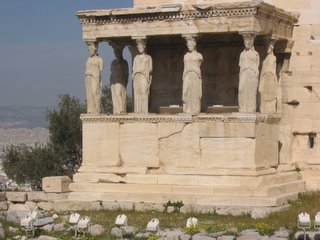
After all, it's pretty much the birthplace of Western Civilization and all that. It's hard to top. I keep thinking back to eighth grade history, when we had to identify the word "Acropolis" and explain all of the various buildings inside it, and look at the sketches recreating what the statue of Athena may have looked like. (There is no statue of Athena nowadays, but apparently historians think that there once was, and it stood inside the Parthenon.)

The Acropolis also has a museum, of couse, which houses a large number of statues and artifacts that were found in the vicinity. It does not, however, house the Elgin marbles. The Elgin marbles, despite sounding like something that my cat would like the bat around the floor, are actually beautiful marble carvings from the Parthenon that were appropriated by Lord Elgin in the 19th Century, and brought to the British Museum, where they have remained ever since. A lot of people are not very happy about this, and I can understand why. It does seem that they ought to remain in their orginal home.
However, the Acropolis museum has no lack of beautiful artwork. I was particularly fond of these feet, which are very realistic. They look like, well, real feet.

I was also quite taken with this cat, who lives in the most famous archeological site in the history of the world, and probably doesn't give a damn about anything except what food she can scrounge up from between the marble slabs.

(I know I am obsessive about cats. Well, I'm just trying to give you another perspective on things. I could post about seventy separate pictures of the Parthenon here. But the thing is, you've all seen pictures of the Parthenon before. You've seen professional pictures of the Parthenon. You don't need my blurry versions with tourists wandering around in front of it, do you?)
After the Acropolis, we saw the new Byzantine museum, which is quite lovely, and took a brief stroll through the war museum before it closed at 2pm. We also took a large number of pictures of each other standing in front of fighter jets in front of the war museum. I don't have these pictures at the moment, as they were not taken with my camera, so I can't post them for you. That's OK with me. Quite frankly, I have very little use for a picture of myself next to a fighter jet, but maybe someday it will come in handy.
At that point, we headed for the train station to buy our tickets home and discovered that every single train was sold out, with the exception of the awful, crack of dawn 6:50am train, and the 11:44pm night train. As I had work to do on Monday, I opted for the wretched crack-of-dawn option, which was thankfully faster than the afternoon one, but also almost three times as expensive. Next time, remind me to make a reservation.
We finished the evening with a drink at a bar in Kolonaki, which is apparently the trendy place to have a drink. I can't tell you all that much about the area, except that the one place we went was quite nice, and seemed to be playing music specially selected for me. (I swear, the radio DJ was using my iPod for music selections). I chatted with my Greek friend and his friends, who quoted various Friends episodes at length, and nodded thoughtfully when I ordered vodka and cranberry juice. ("That's what they drink in New York, huh? Do you watch Sex and the City?") Sometimes I think Greeks could give me a lesson in American culture. On the other hand, they were anxious for me to explain an American stand-up comedy DVD they had just watched, and I tried my best to explain who Al Sharpton is.
And here my Athenian adventure comes to a close. Ultimately, I had a lovely weekend and I liked the city very much. However, I will say that I'm glad to be spending a year in Thessaloniki instead of Athens. The crowds and pollution may not bother me (makes me feel right at home, actually), but here in Thess I'm a little more removed from the tourists and the other Americans, and a little bit more immersed in Greek life.





















